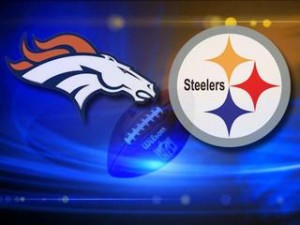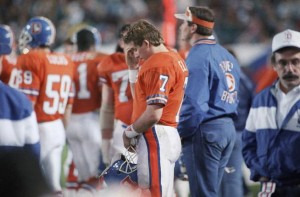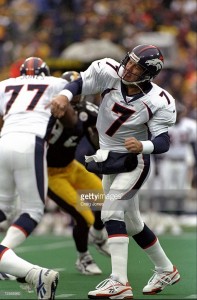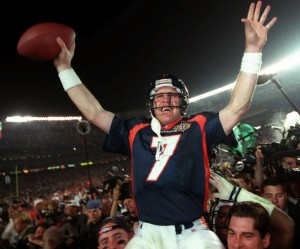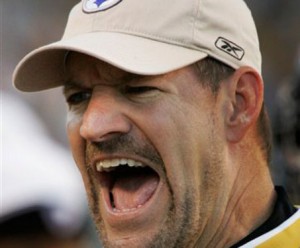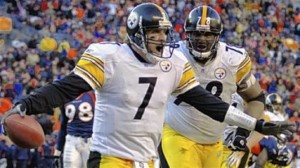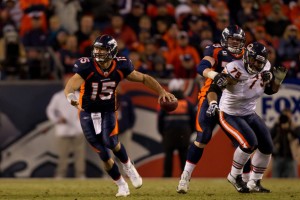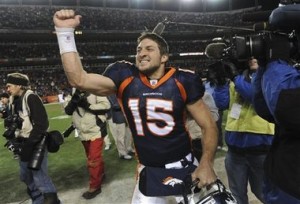By Jeremy Harris
Earlier this week, in anticipation of their divisional round clash this Sunday, we profiled four of the seven playoff games previously played between AFC rivals the Pittsburgh Steelers and Denver Broncos.
Today we will relive their three other playoff matchups, from two of which the eventual Super Bowl champion emerged.
1) Denver at Pittsburgh, January 11, 1998:
Broncos’ QB John Elway, now in his 15th season, was desperately seeking the one prize that had eluded him to that point, a Super Bowl championship. Father time, on the other hand, was charging unblocked from Elway’s blindside like an angry Jack Lambert. Which would prevail in this race against the clock?
Since his rookie season of 1983, Elway had helped guide his team to nine playoff appearances, four AFC championship games and three Super Bowls. He was named the MVP of the 1987 season and had established himself as one of the greatest clutch quarterbacks in league history. Still, the hole in his resume was the size of the Rocky Mountains.
The Broncos (12-4) were trying to become just the fourth team, after the 1980 Oakland Raiders, 1985 New England Patriots and 1992 Buffalo Bills, to make the Super Bowl as a wildcard since a third playoff round was added for the 1978 season; the Kansas City Chiefs (13-3) had denied Denver the AFC West title.
Before facing Pittsburgh, the Broncos had avenged one of the greatest upsets in NFL playoff history from the year before when they crushed the visiting Jacksonville Jaguars 42-17. They fended off a last-second drive by the Chiefs the following week to clinch a 14-10 victory.
Pittsburgh, now in its sixth season behind steel-jawed head coach Bill Cowher, had defeated the New England Patriots, a team that had dispatched them in the playoffs the previous season, in one of the lowest-scoring postseason games in league history 7-6.
Against Pittsburgh, Denver forced four turnovers, including three interceptions by QB Kordell Stewart, Denver RB Terrell Davis gashed the Steelers’ top-ranked rushing defense for 139 yards and John Elway threw two touchdown passes and tallied 210 passing yards.
However, after a Pittsburgh touchdown with just over two minutes remaining cut the score to 24-21, the game was still in doubt. Following the kickoff, Elway connected with TE Shannon Sharp for eighteen yards on third-and-four and found WR Ed McCaffrey for ten yards and another first down on the next play. A second-down 19-yard jaunt by RB Davis allowed the Broncos to run out the clock and seal the victory.
Two weeks later, the Broncos joined the 1980 Raiders as the only wildcard team to win a Super Bowl when they upset the Green Bay Packers 31-24, breaking a 13-year NFC Super Bowl winning streak.
Old Man Elway had finally claimed the trophy that seemed destined to elude him, and for an encore, he led the Broncos to a title the following season before retiring and joining the Mount Rushmore of the greatest quarterbacks in league history.
2) Pittsburgh at Denver, January 22, 2006:
The script was flipped in this AFC championship game. The Steelers (11-5) made the playoffs as a wildcard and had reached the conference title game against the AFC West champion Broncos (13-3) after road wins over the Cincinnati Bengals and Indianapolis Colts. Denver advanced after notching its first playoff victory of the post-Elway era with a win against the New England Patriots.
This time however, Pittsburgh claimed the sentimental figure: Bill Cowher.
The coach of the Steelers since 1992, Cowher had guided his charges to the playoffs nine previous times, reached the AFC Championship game five times and led the Steelers to the 1995 Super Bowl, where they were defeated by the Dallas Cowboys. Cowher’s success was being drowned out by the he-can’t-win-the-big-one chorus that used to rain down on legendary Oakland Raiders’ head coach John Madden until he led his team to a Super Bowl victory in the 1976 season.
The game itself was entirely anticlimactic. Pittsburgh, behind the passing of second-year quarterback Ben Roethlisberger, a mistake-free offense and a defense that produced four turnovers, never trailed, led 24-3 at halftime and prevailed 34-17.
Pittsburgh had joined the 1980 Raiders, 1985 Patriots, 1992 Bills, 1997 Broncos, 1999 Tennessee Titans and 2000 Baltimore Ravens as the only wildcard teams to advance to the Super Bowl. But when they defeated the Seattle Seahawks 21-10 two weeks later, they became the first of this group to win all of its postseason games on the road en route to a championship (the 2007 New York Giants and 2010 Green Bay Packers have since matched the wildcard road prowess of the 2005 Steelers).
Following years of heartache, Cowher proudly and joyously lifted the Lombardi trophy, Pittsburgh’s first since the 1979 season.
After coaching the Steelers in defense of their title the following season, which ended with an 8-8 record and no playoff appearance, Cowher followed Madden’s career path and became a commentator. He has resisted all calls to return to the sidelines.
3) Pittsburgh at Denver, January 8, 2012:
The 2011 Broncos were trying to halt a five-year playoff drought that started with Pittsburgh’s win in the 2005 AFC Championship game. The season started inauspiciously, with the Broncos losing four of their first five games. Head coach John Fox then replaced Kyle Orton, in his third season as the Broncos’ starting QB, with the charismatic but polarizing Tim Tebow, who had won two national titles with the University of Florida.
What followed was the emergence of “Tebowmania”, as the unpolished but gritty passer willed the Broncos to seven wins in his first eight starts, including three overtime triumphs. Despite losing their final three regular season games, the Broncos (8-8) claimed the AFC West title.
Pittsburgh (12-4) was forced to play at Denver on wildcard weekend despite sporting a significantly better regular season record, but the Steelers were still heavily favored. Pittsburgh boasted the league’s best overall defense and the seasoned Roethlisberger under center.
However, The Broncos sacked Roethlisberger five times while the Steelers failed to record a single sack, and Roethlisberger completed just over 50% of his passes. Nevethless, the Steelers mounted a furious comeback to send the game into overtime tied at 23.
Then the magic happened.
On the first play from scrimmage, Tebow connected with WR Demaryius Thomas, who raced 80 yards for a touchdown that sent the Mile High faithful into delirium. What they witnessed was not only the shortest overtime in playoff history, eleven seconds, but the longest play to end a playoff overtime game, eclipsing the 69-yard completion by Carolina Panthers’ QB Jake Delhomme to WR Steve Smith in a 2003 Divisional round matchup with the St. Louis Rams.
The Panthers’ head coach that day was none other than John Fox, and eerily, the final score of both games was 29-23.
The Broncos were trounced the next week in New England 45-10, Tebow was traded during the offseason to make way for Peyton Manning and he has not thrown a regular season pass since 2012 with the New York Jets.
However, nothing will ever dim the luster of his history-making performance against Pittsburgh.
Hopefully Sunday’s matchup between these AFC rivals will produce the kind of high drama that people will be talking about for years to come.
